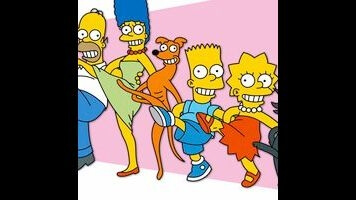The Simpsons: “The D’Oh-cial Network”

The moral dimension of The Simpsons can be surprisingly conservative at times. In “The D’oh-cial Network,” the primary object of satire is the phenomenon of Facebook. Sure, there are a few scenes that specifically parody The Social Network, but the thrust of the satire can be summed up with the age-old cry of parents to their offspring to put that damn thing down and go outside already. Not that Facebook needs defending. Its moment may be passing, but it is still a cultural juggernaut that provides a rather unique service to its users, far though it is from being without blemish. This episode points out only the most blatant of the many faults of Facebook—namely, its hypnotic ability to distract people in a semi-narcissistic haze—to the exclusion of the many other faults that are quite ripe for parody. It then winds up with a sweeping conclusion that damns the whole of the Internet using the same broad strokes.
The writer behind this episode is J. Stewart Burns, who also wrote the best episode of the season thus far, “Holidays Of Future Passed.” There is a moment in “Holidays” when Lisa steps into the future version of the Internet and is immediately besieged by a mountain of friend requests. That was a small yet sharp parody of Facebook’s ubiquity, but this one lays into the same topic with a less deft touch. Fortunately, it has a few good jokes to keep the proceedings moving along, but not enough to rescue the episode from mediocrity.
The framing device is that Lisa is on trial for bringing devastation to Springfield, all because of her selfish desire to be accepted by others. As she recounts her side of the story, the episode moves to its first act, which parodies the popular town centre-style shopping malls. When Lisa discovers that none of her classmates wants to be her friend, she enlists the nerdy kids of Springfield Elementary to help her create an online social network, which she calls SpringFace. By the third act, the whole town has become addicted to her site, which causes mayhem as the Springfieldians ignore their surroundings to focus on their computers or phones.
The first act takes on the communitarian nightmare of fake town centre-style malls with a healthy side dose of anti-consumerism. These malls, with their Disneyesque combination of condos, walkable streets to nowhere, and big box stores masquerading as mom-and-pop places, have sprung up in locales all across the U.S. The satire here is at its fever pitch, mocking those who buy condos at these malls, as well as Marge’s useless gift cards that she kept as investments, the foulness of Cinnabon, Lego’s shift into pre-designed play sets, and the smugness and expense of the Apple store. The problem is that the jokes are as scattershot as their targets and fall more into the scale of wryness rather than hilarity. The best is the Lego/Blocko saleslady’s explanation to Lisa that they do all the imagining for their customers.
When Homer buys an Apple Air analog, the Mapple Void, Lisa discovers that it is easier to have friends online, which leads the episode into its second act. Lisa enlists the nerds to help her create a social network with a template based on Nelson’s oddly specific dismissal of Martin. Soon everyone in Springfield, kid and adult alike, is hooked on her site. The best jokes in this segment are also the most random, and that’s not a good sign for an episode’s coherence. That said, Skinner’s sad admission that he wished his dates were as interesting as his assessment of hornet honey provided a chuckle, as did Homer and Abe’s banter about the alcoholic hippo.
In the third act, as prescribed in The Great Big Simpsons Manual Of Plotlines, the town’s obsession with SpringFace gets out of control, mainly in the form of distracted driving. Considering that Facebook deserves criticism for its unabashed advertising platform, confusing redesigns, obnoxious games, and pushy designation of certain friends as more important than others based on some incomprehensible algorithm, criticizing it for being engrossing is like criticizing the Fox News site for publishing disinformation. Both are doing exactly what they are designed to do. The ensuing traffic problems are amusing enough, but the show concludes by having Lisa shut down SpringFace, which leads immediately to lives resumed, computers and smartphones destroyed, and kids playing outside. That’s a bit too quick a turn, though, slapping a moralistic tone onto all of the preceding satire. While satire and nuance are not necessarily compatible, the moral thrust of a show as culturally successful and dominant as The Simpsons should probably have more to it than mere Luddism.
Stray observations:
- Guest voice of David Letterman as himself in the couch gag with pretty good use of his patented awkwardness.
- “If you were married to da Vinci, you wouldn’t tell him not to da Vinch.”
- “Ralph: Daddy’s gun tastes like pennies.”
- The first coda with Armie Hammer as the Winklevoss twins felt like it was a scene cut from a different version of the script.
- The Edward Gorey-alike second coda was a pleasant surprise, especially the animation.